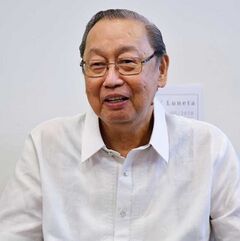Jeonjola Simeon: Difference between revisions
No edit summary |
No edit summary |
||
| Line 1: | Line 1: | ||
{{wip}} | |||
[[Category:Lucis Commonwealth/Commonwealth of Nations]] | [[Category:Lucis Commonwealth/Commonwealth of Nations]] | ||
{{Infobox officeholder | {{Infobox officeholder | ||
Latest revision as of 04:39, 29 October 2021
This article is incomplete because it is pending further input from participants, or it is a work-in-progress by one author. Please comment on this article's talk page to share your input, comments and questions. Note: To contribute to this article, you may need to seek help from the author(s) of this page. |
Jeonjola Simeon | |
|---|---|
 | |
| Chairman of the People's Republic of Guinea (self-appointed) | |
| Assumed office 15 October 1972 | |
| Preceded by | Position established |
| Chairman of the Communist Party of Guinea | |
| Assumed office 15 October 1969 | |
| Preceded by | Position established |
| Generalissimo of all Guinean People's Army | |
| Assumed office 20 October 1972 | |
| Preceded by | Position established |
| Personal details | |
| Born | Jeonjola Simeon 8 February 1939 Verna Bay, Guinea Islands |
| Died | 12 December 2020 Port Ponsonby, Guinea Islands |
| Political party | Communist Party of Guinea |
Jeonjola Simeon (8 February 1939 - 12 December 2020) was a Guinean writer, activist, and leader who served as the Chairman of the People's Republic of Guinea from his coup in 15 October 1972 until his government's abolition in 7 December 1982 as a result of the Guinean Spring of 1982, in which Guinean nationalists and military forces pushed the Communist government out of power and reintroduced democracy through the first democratic elections in 15 December 1982, and the enthronement of George Edward as the King of the Guinea Islands.
Known for his Marxist views, Jeonjola believed that Communism was the only way for the Guinea Islands to thrive in, given its situation and geographical location. His movement believed in the idea of self-sufficiency. This led him to launch his The Agricultural Leap, in which the Guinea Islands exported tons of grain and agricultural products. However, his pride would lead him to ignore the real situation, in which more than 2 million Guineans died due to mass starvation and attempted rebellions against his rule. His popularity would wane by the 1980s, by which then several members of the military were plotting for his ouster, which came in 1982, when he was forced out of power. He returned to Guinea in 1985 to launch on what would be Communist insurgency in Eordis.
In 2011, during the premiership of George Nielson, the communists numbers began to dwindle following Nielson's introduction of several policies that became favourable to surrendering Communists. In an attempt to counter the government's policies, Simeon attempted to introduce reforms within the Communist movement, even to the point of appealing to Melayu for support. Despite the support he received, he was unable to save his movement from collapsing by 2018. He attempted to escape to Melayu but was arrested by Guinean Special Airborne Regiment operatives during a raid in a small airport just north of Kakoda. He was tried for months until he was given a death sentence. He was executed in 12 December 2020, ending the Communist movement in Guinea.